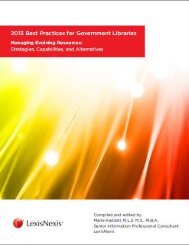2012 Best Practices for Government Libraries
2012 Best Practices for Government Libraries
2012 Best Practices for Government Libraries
Create successful ePaper yourself
Turn your PDF publications into a flip-book with our unique Google optimized e-Paper software.
183<br />
BEST PRACTICES <strong>2012</strong><br />
interview collecting, workshops and promotion. Educational institutions at the<br />
secondary and university level have incorporated the project as a part of course<br />
work as well as community service. Professional organizations, such as the National<br />
Court Reporters and the American Red Cross, provide an impressive number of<br />
interviews.<br />
<strong>Libraries</strong> have been key VHP participants. Public libraries in Wisconsin, Florida,<br />
Maryland, Tennessee, and Cali<strong>for</strong>nia, to name a few, have collected interviews or<br />
sponsored oral histories instruction sessions. They also have provided facilities<br />
where others can record interviews. The Illinois State Library working with schools<br />
and other organizations has executed a state-wide veterans interview program.<br />
VHP is working with federal libraries within the Department of Defense and other<br />
governmental agencies to establish VHP interview collecting among their own staff<br />
as well as their patrons. Many libraries recognize the value in retaining their own<br />
copies of VHP interviews as a reference resource. In short, libraries are a natural<br />
vehicle <strong>for</strong> VHP participation and promotion.<br />
Perhaps the most fulfilling effect of the Veterans History Project is the gift that it<br />
gives to the many families who now have a more complete account of their<br />
veteran’s military service. There is reluctance <strong>for</strong> many veterans to tell their story.<br />
It can be modesty, a feeling that someone just wouldn’t understand what they are<br />
talking about or an emotional inability to relate a terrible wartime experience. VHP<br />
does provide a serious and structured way <strong>for</strong> a veteran to tell their story and on<br />
more than one occasion has revealed in<strong>for</strong>mation that has been long kept inside.<br />
For many veterans, it has been a great release and a relief. For some it has been a<br />
sense of pride in per<strong>for</strong>ming another patriotic act <strong>for</strong> their country. For their<br />
families, it has filled a chapter in their legacy that may have gone empty.<br />
The Library of Congress Veterans History Project website, www.loc.gov/vets ,<br />
provides in<strong>for</strong>mation about the project, a database of veterans’ collection, an<br />
Experiencing War series and a VHP Field Kit that spells out instructions on the<br />
completion and submission of a veteran’s recollections. With over 17 million living<br />
wartime veterans, VHP encourages their participation in relating their<br />
remembrances. More importantly, it looks to everyone who has a veteran in their<br />
life to make the ef<strong>for</strong>t to record their story of service and sacrifice and submit it to<br />
the Nation’s Library where it will be preserved to instruct, in<strong>for</strong>m and inspire<br />
generations to come.



